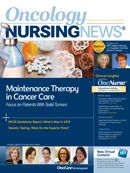Making the Move to Exercise
Amy Hoffman, MSN, PhD, RN, from Michigan State University's College of Nursing, offers practical tips to help initiate a regular exercise strategy for cancer patients and survivors.
Amy J. Hoffman, MSN, PhD, RN
Assistant Professor, Michigan State University College of Nursing
In 2012, nearly 13.7 million Americans were living with a history of cancer, and an estimated 1.6 million Americans are facing a diagnosis of cancer in 2013. Clearly, surviving cancer and making it through cancer treatment is a tremendous triumph. Most cancer survivors actively seek out strategies to prevent recurrence and optimize health and well-being.
The benefits of exercise for the general population are well documented. Moreover, exercise is now being recognized as an important strategy in the fight against cancer.
Several studies suggest that higher levels of physical activity are related to lower risk of recurrence and longer survival. In addition, exercise has many of the same benefits for cancer survivors as it does for the general population, including improved fitness, greater muscle strength, a leaner body mass, improved mental well-being, greater self-esteem, decreased risk associated with cardiovascular disease and diabetes, and improvements in hypertension, arthritis, chronic obstructive lung disease, and more.
Likewise, there is evidence that exercise can be beneficial to manage symptoms such as fatigue from cancer and its treatment, as w ell as to improve functional status. This is important since nearly 25% of people wit h chronic illness such as cancer have one or more daily activity limitations, and people want to engage in activities they enjoy.
When should a person start exercising after cancer diagnosis and treatment?
The response I often give is: “As soon as possible.” It is important to note that mounting evidence has yielded a short and important message for cancer survivors: Avoid inactivity.
Unfortunately, research as well as my observation in clinical practice has shown that after a diagnosis of cancer, people slow down due to many factors, such as reports of distress; feelings of sadness and being upset; feeling sick from cancer and its treatment, and fatigue.
In addition, despite today’s best evidence, many healthcare providers continue to recommend rest or “taking it easy” over exercise for the treatment of fatigue. In contrast, for those persons undergoing active treatment and for those who have completed treatment, the general exercise guidelines for cancer survivors include:
- Avoiding inactivity
- Returning to normal daily activities as quickly as possible after surgery
- Continuing normal daily activities and exercise as much as possible during and after nonsurgical treatments
How do patients and survivors get started?
The advice I give is to make a plan, because like anything else: failing to plan is a plan to fail. Consequently, the following are some general strategies we can suggest to our patients who want to initiate regular exercise:
Identify exercises that are doable. Create an exercise plan that starts at the patient’s level of ability. This means that unless a patient has continued to be active, he or she should start light, with achievable goals, and gradually increase the level of exercise. Exercise is a marathon and not a race. Gradual changes lead to permanent, positive results.
Make exercise fun. Ask the patient to identify an enjoyable activity where he or she finds richness in the exercise environment. Encourage the patient to include a friend to increase motivation. Have the patient identify a time that is conflict-free, making it easy to maintain a routine exercise plan.
Take exercise breaks. The patient should build in planned breaks to rest, recover, re-motivate, and reward, and take breaks during injury or illness.
Overcome exercise barriers. Suggest that patients identify the best exercise activity for them. Have the patient schedule exercise during their most energetic part of the day. Have the patient identify time slots and make regular exercise a reality, enlisting support from their family and friends.
Consult an exercise expert. An exercise specialist can assist in tailoring the right exercise plan.
Shared Model of Care Post-HCT Offers Safe Follow-Up, Reduces Patient Burden
Published: March 19th 2025 | Updated: March 19th 2025Alternating post-HCT care between specialized facilities and local cancer centers produced noninferior non-relapse mortality and similar quality of life to usual care.



